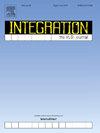Improved adaptive sliding mode control for non-ideal single-inductor dual-output boost converter
IF 2.2
3区 工程技术
Q3 COMPUTER SCIENCE, HARDWARE & ARCHITECTURE
引用次数: 0
Abstract
Single-inductor dual-output (SIDO) boost converters have been applied in portable electronic devices, but the cross-regulation severely deteriorates its dynamic performance. Meanwhile, parasitic parameters have a significant impact on the cross-regulation. To suppress the cross-regulation and improve the performance of a non-ideal SIDO boost converter, an improved adaptive sliding mode control strategy is proposed in this paper. Considering the parasitic resistor of the inductor, capacitors and MOSFETs, a nonlinear mathematical model of the non-ideal SIDO boost converter is established. Based on the differential geometry theory, a set of output functions that meet the requirements of exact feedback linearization is constructed to linearize the model. An improved adaptive reaching law is proposed to reduce the sliding mode chattering. Combining adaptive technology, improved adaptive sliding mode controllers are designed. The stability and robustness of the control system are verified based on Lyapunov theory. Compared with the existing control method, simulation and experimental results show that the proposed control strategy provides a rapider response, lower cross-regulation, and better performance.
求助全文
约1分钟内获得全文
求助全文
来源期刊

Integration-The Vlsi Journal
工程技术-工程:电子与电气
CiteScore
3.80
自引率
5.30%
发文量
107
审稿时长
6 months
期刊介绍:
Integration''s aim is to cover every aspect of the VLSI area, with an emphasis on cross-fertilization between various fields of science, and the design, verification, test and applications of integrated circuits and systems, as well as closely related topics in process and device technologies. Individual issues will feature peer-reviewed tutorials and articles as well as reviews of recent publications. The intended coverage of the journal can be assessed by examining the following (non-exclusive) list of topics:
Specification methods and languages; Analog/Digital Integrated Circuits and Systems; VLSI architectures; Algorithms, methods and tools for modeling, simulation, synthesis and verification of integrated circuits and systems of any complexity; Embedded systems; High-level synthesis for VLSI systems; Logic synthesis and finite automata; Testing, design-for-test and test generation algorithms; Physical design; Formal verification; Algorithms implemented in VLSI systems; Systems engineering; Heterogeneous systems.
 求助内容:
求助内容: 应助结果提醒方式:
应助结果提醒方式:


